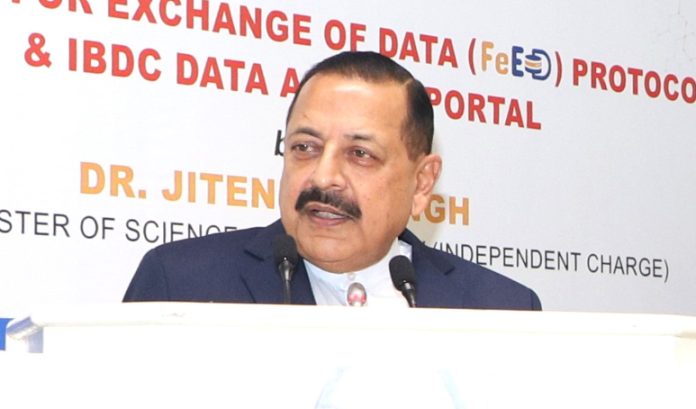NEW DELHI, Jan 9 : Science and Technology Minister Dr. Jitendra Singh today released the Genome India data related to 10,000 genome samples archived at the Indian Biological Data Centre (IBDC) and now made available to researchers not just in India but across the globe.
The Minister also launched ‘Framework for Exchange of Data Protocols (FeED) and Indian Biological Data Centre (IBDC) Portals for Data Access at “Genome India Data” Conclave today at Vigyan Bhavan here.
On the occasion, Prime Minister Narendra Sh Narendra Modi’s Video Message motivated the scientific fraternity and also laid a roadmap for the future.
The Department of Biotechnology (DBT) has implemented the flagship project, ‘GenomeIndia,’ for whole genome sequencing (WGS) of 10,000 individuals representing various Indian populations. This project aims to create a comprehensive catalogue of genetic variations, making it a valuable scientific resource for the country. Access to the GenomeIndia Data by researchers will propel genomics research and enable the design of genome chips for large-scale genetic studies at an affordable cost, with higher precision for imputing genetic variants.
To ensure the responsible release of such high-quality, nation-specific data, the Department has formulated the ‘Framework for Exchange of Data (FeED) Protocols’ under the Biotech-PRIDE Guidelines. This framework sets the stage for sharing biological data in a fair, transparent, and responsible manner.Biotech-PRIDE Guidelines were also launched by Dr. Jitendra Singh in 2021.
Addressing the conclave Dr. JitendraSingh said “The new Bioeconomy policy rolled out by the Modi Govt is set to place India as a global leader in the years to come”. He added that “India’s bio economy has experienced remarkable growth, skyrocketing from $10 billion in 2014 to over $130 billion in 2024, with projections to reach $300 billion by 2030. This surge reflects India’s robust economic growth. The BIOe3 policy will reignite growth spirits and position India as a potential leader in the 4th industrial revolution, he said.
“Whole genome samples 10000 samples archived at IBDC now made available to researchers not just in India but across globe.”he said now we have Indian genome data which would go at length to serve our india’s interests in healthcare.Dr. Jitendra Singh categorically mentioned that these will play a vital role in large-scale manufacturing of products like mRNA-based vaccines and proteins.
Going further, Dr. Jitendra Singh highlighted that “India now ranks 12th in the world in biomanufacturing and 3rd in Asia-pacific. We are the largest vaccine manufacturer and the 3rd largest StartUp ecosystem,” adding, the Biotech ecosystem in the country is emerging at a rapid pace with the setting up of 95 bio incubators and increasing numbers of Biotech Startups. The Biotech Startups have experienced remarkable growth, increasing from just about 50 in 2014 to nearly 9,000 today. The rise of Biotech Startups is pivotal for our future economy. Genome India Data would come in handy. He also suggested to rope in TATA memorial hospital for provision of cancer related data to enrich this.
Prof. Ajay Kumar Sood, Principal Scientific Adviser to the Government of India; Dr. Rajiv Bahl, Director General, ICMR & Secretary, DHR; and Dr. Rajesh S. Gokhale, Secretary, DBT, along with senior officials, directors, scientists, doctors, and professionals from the concerned scientific ministries, departments, and institutions.
Dr. Suchita Ninawe, a senior official at DBT, who has played a key role in establishing the Indian Biological Data Centre and steering the ‘GenomeIndia’ project, emphasized that the data generated through the GenomeIndia project represents a treasure for genomics research in India.
Home Latest News Dr Jitendra Addresses ‘Genome India’ Conclave, Focuses On Gene Based Medical Management


